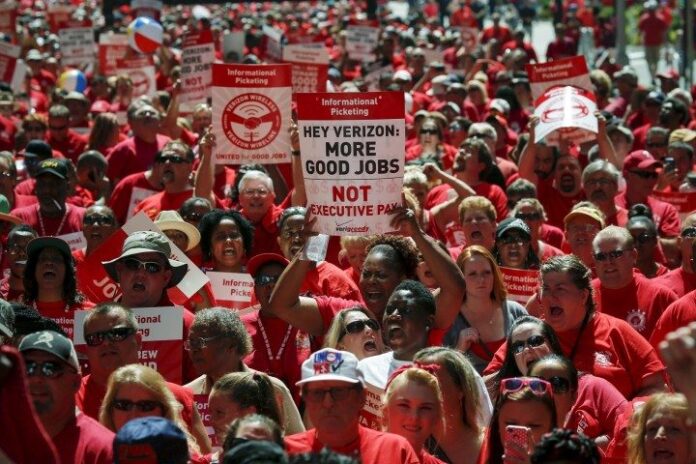If a strike happens, Verizon says its ready
Some 39,000 unionized Verizon workers are threatening to strike beginning April 13 pending a negotiated employment contract materializing between now and then despite 10 months of negotiations getting us to this point.
Repped by the Communication Workers of America and the International Brotherhood of Electrical Workers, the employees involved work on both the wireline and wireless sides of Verizon.
In an announcement, the CWA workers listed their grievances with the telecom company:
- Offshoring and contracting out even more customer service work to Mexico, the Philippines and other locations.
- Cutting job security for all workers.
- Requiring technicians to work away from home for as long as two months, without seeing their families. For anyone trying to balance work and family life, this is impossible.
- Refusing to negotiate improvements to wages, benefits and working conditions for Verizon Wireless workers, who formed a union with CWA in 2014.
- Freezing pensions at 30 years of service and forcing retirees to pay extremely high health care costs.
- Slashing benefits for workers injured on the job.
Roanoke, Va.-based technician Dan Hylton, a 20-year Verizon veteran, said his work schedule makes it hard for him to have a “decent life.”
“Verizon is already turning people’s lives upside down by sending us hundreds of miles from home for weeks at a time, and now they want to make it even worse. Technicians on our team have always been happy to volunteer after natural disasters when our customers needed help, but if I was forced away from home for two months, I have no idea what my wife would do. She had back surgery last year, and she needs my help. I just want to do a good job, be there for my family, and have a decent life.”
Asked by Reuters about the potential for negotiations ahead of a strike, Verizon spokesman Rich Young said nothing is scheduled but, “We are available.”
“We’ve tried to work with union leaders to reach a deal,” Marc Reed, Verizon’s chief administrative officer, told The Wall Street Journal. “Verizon has been moving the bargaining process forward, but now union leaders would rather make strike threats than constructively engage at the bargaining table.”
Last month a group of 20 U.S. senators sent a letter to Verizon CEO Lowell McAdam asking for resolution to the ongoing labor dispute.
The senators pressed for resolutions so Verizon can “move forward in investing in state-of-the-art broadband buildout for communities around our states, including currently underserved areas.”
“It is our understanding that the Communications Workers of America and the International Brotherhood of Electrical Workers have offered to negotiate substantial savings in health care for the wireline workforce, but there are additional areas of concern for your workers, including job security, the treatment of sick and injured workers, pensions and the contracting out of work,” the letter states. “While we recognize that changes in technology and customer preference have led to a decline in landline service, driving the need for some contract changes, we also want to be sure that Verizon preserves good family supporting jobs in our region. At the same time, Verizon’s wireless side of the business has seen a surge in demand, indicating the need to negotiate a new contract that offers an opportunity to provide improvement in wages, health care, retirement security, and work rules for the wireless retail workers and technicians who have been at the heart of Verizon’s success in this market and beyond that has driven the company’s impressive profitability of $39 billion in the last three years.”
For now, the strike is set to commence at 6 a.m. Wednesday.

